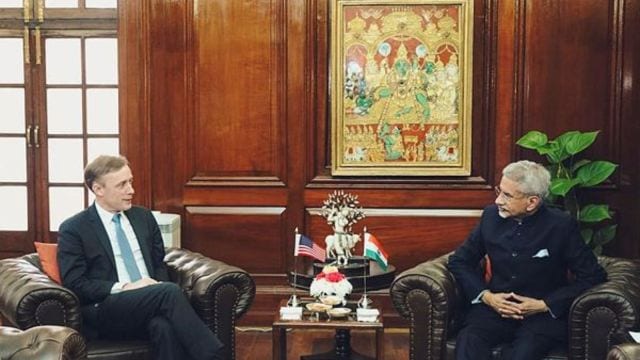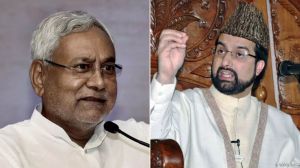In an incremental step towards operationalising the Indo-US nuclear deal, US National Security Advisor Jake Sullivan announced Monday that Washington is finalizing steps to remove long-standing regulations that have prevented civil nuclear cooperation between India’s leading nuclear entities and US companies.

The US Entity List is a list of foreign individuals, businesses, and organizations that are subject to export restrictions and licensing requirements for certain goods and technologies. The list — compiled by the Bureau of Industry and Security (BIS) of the U.S. Department of Commerce — is ostensibly used to prevent unauthorized trade in items that could be diverted to terrorism, weapons of mass destruction (WMD) programs, or other activities that are perceived by the US as going its foreign policy or national security interests.
Prime Minister Narendra Modi, who met Sullivan, posted on X: “The India-US Comprehensive Global Strategic Partnership has scaled new heights, including in the areas of technology, defence, space, biotechnology and Artificial Intelligence. Look forward to building upon this momentum in ties between our two democracies for the benefit of our people and global good.”
Speaking at IIT Delhi, Sullivan, who met NSA Ajit Doval and External Affairs Minister S Jaishankar, said: “Although former (US) President (George W) Bush and former Prime Minister (Manmohan) Singh laid out a vision of civil nuclear cooperation nearly 20 years ago, we have yet to fully realize it…the Biden administration has determined that it is past time to take the next major step in cementing this partnership.”
“So today, I can announce that the United States is now finalizing the necessary steps to remove long standing regulations that have prevented civil nuclear cooperation between India’s leading nuclear entities and US companies. The formal paperwork will be done soon, but this will be an opportunity to turn the page on some of the frictions of the past and create opportunities for entities that have been on restricted lists in the United States to come off those lists and enter into deep collaboration with the United States, with our private sector, with our scientists and technologists, to move civil nuclear cooperation forward together”, he said.
Sullivan added: “This is a statement of confidence in the progress we have made and the progress we will continue to make as strategic partners and as countries who share a commitment to peaceful nuclear cooperation. It’s also the result of India’s open and transparent engagement with our administration over the course of four years, which has enabled us to open this new chapter together.”
Story continues below this ad
The announcement, a fortnight before US President-elect Donald Trump assumes office, is significant as the Indo-US civilian nuclear deal in 2008, has not been operationalised in more than a decade and half.
Sullivan also announced that India-US commercial and civil space partnership is set to “lift off” with President Biden signing “certain papers.” This move, he said, will help bolster cooperation in areas of missile technology.
A joint statement said Sullivan briefed the Indian side on the “updates brought out by the Biden administration to US missile export control policies under the Missile Technology Control Regime (MTCR) that will boost US commercial space cooperation with India”.
Sources said this essentially means that some US regulations will be relaxed so that US can share some of its “high technologies, like in the area of rockets.”
Story continues below this ad
Sullivan underlined the challenges faced by the Biden administration in dealing with India, “Of course, none of the work we’ve done together over any of these years has been easy. We have had to navigate our fair share of turbulence, legacy relationships, tensions over trade, as well as over human rights and the rule of law at home and abroad, but we’ve navigated these issues together with our eye on the long game, and our ability to do so reflects the deep and enduring resilience between the US and India, across generations, across administrations and yes, across the aisle.”
Naming China for weaponizing dependencies, Sullivan criticised China for its “predatory industrial strategies” in certain critical sectors including in chip manufacturing, clean energy and other emerging technologies. US companies looking for more resilience in both their markets and their supply chains are shifting out of China and expanding into India, he said.
“Take, for example, Apple’s significant investment in Indian production. Within the next couple of years, over 1/4 of all iPhones in the world will be made right here in India,” he said.
While talking about supply chains, Sullivan said the US, India and other key democratic nations have all been reminded “abruptly and sharply” that “we cannot ignore the ways in which interdependencies can be weaponized against us”, in a thinly veiled reference to China.
Story continues below this ad
“We’ve seen countries lose access to critical minerals that support our clean energy, we’ve seen companies struggling to compete against China’s predatory industrial strategies in chips and clean energy and other emerging technologies,” he said.
“We’ve seen repeated attacks on industries tied to our structure which is heightening the risks not only to cyber espionage but of destructive sabotage,” the US NSA said.
That’s why, he said, India and the US are investing in national programs and sectors that have become “overly reliant on a single country”.
In his address, Sullivan also said that India-US collaboration is crucial for peace and stability in the Indo-Pacific.
Story continues below this ad
In an oblique reference to Russia, Sullivan said, “..we see more and more new technologies diverted to unfriendly actors. The US and India are going to have to ensure that valuable dual use technologies don’t fall into the wrong hands.” The US has been wary of the Russian S-400 air defence system and how that might compromise the security and integrity of US aviation platforms.
Sullivan credited NSA Ajit Doval for the establishment of Initiative on Critical and Emerging Technologies (iCET), a key Biden initiative, and underlined what he called their “deep personal relationship, deep professional relationship,” that, he said, had helped play a key role in taking the bilateral partnership to a “new high level.”
The joint statement said, “The current visit gave them the opportunity to review ongoing progress in their high-level dialogue, including in diverse fields such as Defence, Cyber and Maritime Security.”
Indeed, Sullivan’s current visit is also to ring-fence iCET – this has got both NSAs to lead the conversation cutting across tech and strategic domains, from AI to quantum computing, semiconductors to space.
Story continues below this ad
A Prime Minister’s Office statement said, “Recalling his various meetings with President Biden, including during his visit to the US in September 2024 for the Quad Leaders’ Summit, PM (Modi) appreciated President Biden’s contributions towards strengthening of the India-US Comprehensive Global Strategic Partnership, which leaves an enduring legacy. PM deeply appreciated a letter from President Biden handed over to him by NSA Sullivan… PM conveyed his best wishes to President Biden and the First Lady Dr. Jill Biden.”
“PM reaffirmed his commitment to continue to deepen close cooperation between the two democracies for the benefit of the people of the two countries and for the global good,” the PMO statement said.
Earlier in the day, after his meeting with Sullivan, Jaishankar acknowledged Sullivan’s “personal contribution” towards a stronger India-US partnership.
In the last week of December, Jaishankar had met Sullivan in the US on his visit to Washington DC and his possible successor US Congressman Michael Waltz, US President-elect Donald Trump’s nominee for National Security Advisor. This was the first high-level contact with the incoming Trump administration.









